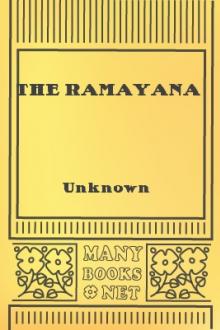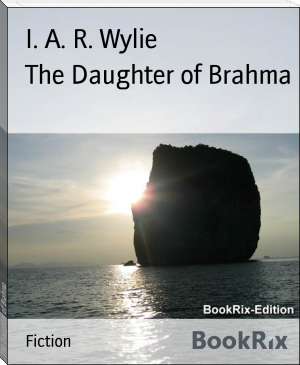The Ramayana - Valmiki (best ereader for epub txt) 📗

- Author: Valmiki
- Performer: -
Book online «The Ramayana - Valmiki (best ereader for epub txt) 📗». Author Valmiki
Raghuvaṇśa Cantos XIV, XV.
“He cleared the earth thrice seven times of the Kshatriya caste, and filled with their blood the five large lakes of Samanta, from which he offered libations to the race of Bhrigu. Offering a solemn sacrifice to the King of the Gods Paraśuráma presented the earth to the ministering priests. Having given the earth to Kaśyapa, the hero of immeasurable prowess retired to the Mahendra mountain, where he still resides; and in this manner was there enmity between him and the race of the Kshatriyas, and thus was the whole earth conquered by Paraśuráma.” The destruction of the Kshatriyas by Paraśuráma had been provoked by the cruelty of the Kshatriyas. Chips from a German Workshop, Vol. II. p. 334.
The scene in which he appears is probably interpolated for the sake of making him declare Ráma to be Vishṇu. “Herr von Schlegel has often remarked to me,” says Lassen, “that without injuring the connexion of the story all the chapters [of the Rámáyan] might be omitted in which Ráma is regarded as an incarnation of Vishṇu. In fact, where the incarnation of Vishṇu as the four sons of Daśaratha is described, the great sacrifice is already ended, and all the priests remunerated at the termination, when the new sacrifice begins at which the Gods appear, then withdraw, and then first propose the incarnation to Vishṇu. [pg 532] If it had been an original circumstance of the story, the Gods would certainly have deliberated on the matter earlier, and the celebration of the sacrifice would have continued without interruption.” Lassen, Indische Alterthumskunde, Vol. I. p. 489.
Son of Vivasvat=Jima son of Vivanghvat, the Jamshíd of the later Persians.
“The idea of fate was different in India from that which prevailed in Greece. In Greece fate was a mysterious, inexorable power which governed men and human events, and from which it was impossible to escape. In India Fate was rather an inevitable consequence of actions done in births antecedent to one's present state of existence, and was therefore connected with the doctrine of metempsychosis. A misfortune was for the most part a punishment, an expiation of ancient faults not yet entirely cancelled.” Gorresio.
“Though of royal extraction, Viśvámitra conquered for himself and his family the privileges of a Brahman. He became a Brahman, and thus broke through all the rules of caste. The Brahmans cannot deny the fact, because it forms one of the principal subjects of their legendary poems. But they have spared no pains to represent the exertions of Viśvámitra, in his struggle for Brahmanhood, as so superhuman that no one would easily be tempted to follow his example. No mention is made of these monstrous penances in the Veda, where the struggle between Viśvámitra, the leader of the Kuśikas or Bharatas, and the Brahman Vaśishtha, the leader of the white-robed Tritsus, is represented as the struggle of two rivals for the place of Purohita or chief priest and minister at the court of King Sudás, the son of Pijavana.” Chips from a German Workshop, Vol. II. p. 336.
“No house is supposed to be without its tutelary divinity, but the notion attached to this character is now very far from precise. The deity who is the object of hereditary and family worship, the Kuladevatá, is always one of the leading personages of the Hindu mythology, as Śiva, Vishṇu or Durgá, but the Grihadevatá rarely bears any distinct appellation. In Bengal, the domestic god is sometimes the Sálagrám stone, sometimes the tulasi plant, sometimes a basket with a little rice in it, and sometimes a water-jar—to either of which a brief adoration is daily addressed, most usually by the females of the family. Occasionally small images of Lakshmi or Chaṇdi fulfil the office, or should a snake appear, he is venerated as the guardian of the dwelling. In general, however, in former times, the household deities were regarded as the unseen spirits of ill, the ghosts and goblins who hovered about every spot, and claimed some particular sites as their own. Offerings were made to them in the open air, by scattering a little rice with a short formula at the close of all ceremonies to keep them in good





Comments (0)